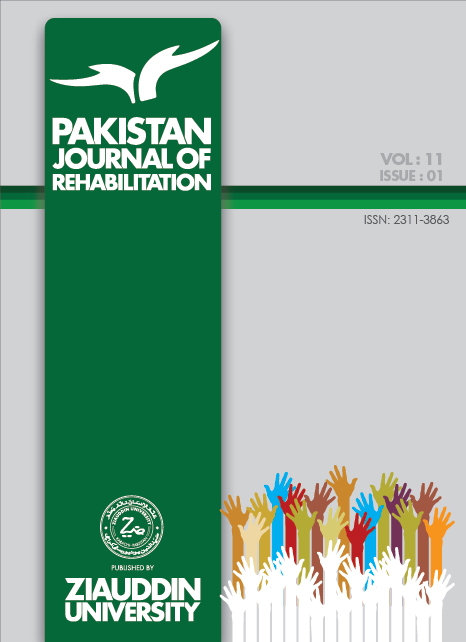Choose not to Place ‘Dis’ in My Ability
Abstract
Our thoughts create actions, these actions turn to habits. And habits turn into a lifestyle of unamendable behavior. To nip the evil in the bud, we must provoke thought. Disability; a word not unknown to many, often stereotyped. Differently-abled; a paradigm shift of thought. People who are differently abled are judged, bullied, looked down upon and ridiculed by the general public with an ambivalent set of stereotypes. These ambivalent stereotypes lead to the experience of subtle forms of stigma, such as not being taken seriously and not being granted rights, which can induce inequality and limited opportunities for participation. In our research, we identified the underlying views and behaviors shown towards differently abled and investigated the relationship between level of familiarity and stereotypical/ discriminatory behaviors. The Supreme Court of Pakistan has ordered the government to discontinue the use of derogatory terms such as “disabled,” “physically handicapped,” and “mentally retarded” in all official documents. The current Government promised to ensure 2% job quota fulfillment for differently-abled persons yet there are 3 million atypical individuals in the country. Negative attitudes contribute significantly to the success or failure of atypical individuals as they seek ways to work, live independently and participate in community life. It is clear that the society’s attitudes are important determinants for the acceptance and support of atypical individuals and for the opportunities offered to them. A cross-sectional survey within a representative sample of the Pakistani population (n=287) was used. Stereotypes were analyzed with adapted ATDP (Attitude Towards Disabled Persons). The results found that when the contact rate or level of familiarity is high, the attitude towards the differently abled individual is positive; when the contact rate of the differently abled individual is low, the attitude towards the disabled is negative. The familiarity of contact refers to interacting with atypical individuals, whether in the social, family, professional or clinical level. Higher levels of familiarity, education, training of public with differently abled individuals side by side and the formation of positive relationships between them encourages a positive attitude towards the differently abled. The proven results showed the root hindrances society proposes to inclusivity and independent living. The result signifies the role every individual plays in reforming these
views and providing support and acknowledging their abilities. Continuing exploration of experiences of stigmatization by people who are differently abled is needed in an effort to discover social factors that inhibit their freedom to act according to themselves.
In order to bring a change, awareness and inclusivity are an important factor in developing right attitude towards differently abled. This letter is aimed to highlight and spark conversations for the development and sophistication of anti-stigma interventions and thereby potentially contribute to rehabilitation programs and participation opportunities for them.
References
Hassanein EE. Changing teachers’ negative attitudes toward persons with intellectual disabilities. Behavior modification. 2015 May;39(3):367-89.
Bywaters P, Ali Z, Fazil Q, Wallace LM, Singh G. Attitudes towards disability amongst Pakistani and Bangladeshi parents of disabled children in the UK: considerations for service providers and the disability movement. Health & social care in the community. 2003 Nov;11(6):502-9.
Alghazo EM, Dodeen H, Algaryouti IA. Attitudes of pre-service teachers towards persons with disabilities: Predictions for the success of inclusion. College Student Journal. 2003 Dec 1;37(4):515-22.
Bešić E, Paleczek L, Gasteiger-Klicpera B. Don’t forget about us: attitudes towards the inclusion of refugee children with (out) disabilities. International Journal of Inclusive Education. 2020 Jan 28;24(2):202-17.
Frankie LJ. Attitudes towards individuals with disability amongst students and employees in a higher education institution in the Western Cape.

Published
How to Cite
Issue
Section
License
Copyright (c) 2022 Pakistan Journal of Rehabilitation

This work is licensed under a Creative Commons Attribution 4.0 International License.



